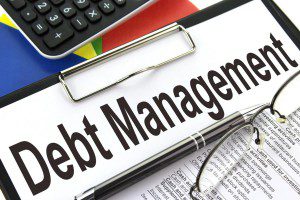Is Debt Consolidation Right for You?
When most people think of debt consolidation, they usually think of a loan. However, while debt consolidation loans are the most popular way to consolidate debt, they are not the only way. There is a range of options that provide the benefits of combining multiple bills into one monthly payment with low or no interest.
This guide will help you understand what those options are and how they work. You’ll also learn how to decide if consolidation is the best way to get out of debt in your situation.
What is debt consolidation?
Debt consolidation is more of a financial process than a single financial product. This process allows you to roll multiple bills into a single monthly payment. The goal is to not only simplify repayment but reduce or eliminate the interest charges applied to your debt.
In most cases, you accomplish this by getting new financing to pay off your existing debts. For example, a debt consolidation loan is an unsecured personal loan. You use the funds from the loan to pay off your credit cards and other high-interest rate debts.
Always keep in mind that the goal of debt consolidation is to minimize interest. It should reduce the total cost of paying off your debt, the time it takes to pay it off, and—in many cases—your total monthly payment.
Ways to consolidate debt
All the following tools allow you to consolidate debt:
- Personal debt consolidation loan
- Balance transfer credit card
- Personal line of credit (LOC)
- Debt management plan
The first three of these solutions are financial products you can take out through your financial institution or another creditor. This means you will need to meet certain qualification requirements to get approved for these products. Lenders and credit card companies have minimum credit score and debt-to-income ratio requirements you must meet to get approved.
Do you have more questions about consolidation? Speak to a counsellor today.
As a result, not everyone can qualify for these options. If you have a poor credit score or a high debt-to-income ratio, you may have trouble qualifying for new credit. You must also ensure that the interest rate you qualify for is low enough to provide the cost-saving benefits you need.
The last option that consolidates debt does not involve getting new financing. Instead, you work with a credit counselling service to set up a consolidated credit repayment plan. Your debts are still combined into one monthly payment with little to no interest. However, you still owe your original creditors. The credit counselling team simply works with your creditors on your behalf to set up an affordable repayment plan.
Featured Video
Jeff on Consolidation
Jeff Schwartz talks about the process and sheds some light for the uninitiated.
Here are how these four solutions compare based on five key factors:
| Recommended debt amount | Balance transfer: Up to $5,000 Debt consolidation loan: Up to $25,000 Personal line of credit: Up to $30,000Debt management plan: Any debt amount |
| Credit score required | Balance transfer: Good-excellent (660+) Debt consolidation loan: Good-excellent (660+) Personal line of credit: Good-excellent (660+) Debt management plan: No minimum credit score required |
| Cost | Balance transfer: Transfer fee up to 3% of each balance transferred, plus interest Debt consolidation loan: Origination fee of 0.5-8% of the amount borrowed, plus interest Personal line of credit: Annual maintenance fee of up to $150, plus transaction fees up to $75 Debt management plan: One-time setup and monthly administration fee, based on total debt and budget |
| Time to payoff | Balance transfer: 12-18 months Debt consolidation loan: 24-60 months Personal line of credit: No time limit Debt management plan: 36-60 months |
| Credit score impact | Balance transfer: Positive Debt consolidation loan: Positive Personal line of credit: Positive Debt management plan: 2-year credit report notation |
Using home equity to consolidate debt
Several other financial products can be used to consolidate debt if someone owns a home. These mortgage products borrow against the equity a homeowner has available in the home. Home equity is the current market value of a home minus the remaining balance on the mortgage.
In most cases, a homeowner can borrow against up to 80 percent of the equity available on the home. That equity can be used for a variety of purposes, including paying off existing debt.
These mortgage products can be used for debt consolidation:
- Home equity line of credit (HELOC)
- Home equity loan
- Mortgage refinancing
- Second mortgage
- Reverse mortgage
It’s important to note that borrowing against equity can be risky, particularly if you are already facing financial challenges. Home equity products are secured debt that uses your home as collateral. If you fall behind on the payments, you may face foreclosure.
What’s more, borrowing against equity decreases your net worth. You turn an asset into a liability, which are the two measures used to assess insolvency. In other words, if your bet against your equity doesn’t pay off, it may move you one step closer to bankruptcy.
If you are a homeowner who is considering borrowing against your equity, think carefully and always consult with a qualified mortgage professional. However, for this guide, we will focus on the other unsecured methods of consolidating debt.
How does debt consolidation work?
Do-it-yourself debt consolidation
While do-it-yourself consolidation products work in slightly different ways, the process is largely the same.
- First, you shop around for the product that you want, whether that’s a loan, a credit card, or a line of credit.
- Make sure to check with your financial institution and apply for quotes online to compare rates and terms.
- When you find a product that fits your needs, you apply for it.
- The lender will evaluate your credit and finances to see if you qualify. You need good credit to qualify for the lowest interest rate possible.
- Once you are approved, you use the new credit line to pay off your existing accounts.
- This leaves only the new loan or line of credit to pay off.
For this solution to work effectively, you need to create a budget and make sure your expenses are in line with your income. You should also have money allocated for savings to cover emergencies and unexpected expenses. This will allow you to stop making new credit card charges until the consolidated debt is paid off.
If you can’t balance your budget, then you risk running up new balances on your credit cards. You can end up with more debt instead of less.
Consolidating debt with a debt management plan
If you cannot consolidate debt effectively on your own with new financing, then you will likely need professional support to get out of debt. A debt management plan offers a practical alternative to consolidate debt.
- Contact a credit counselling organization like Consolidated Credit to get a free evaluation from a trained credit counsellor.
- The counsellor will review your debts, credit, and budget to see if a debt management plan is the best choice for paying off your debt.
- If so, they will work with you to find a monthly payment that you can afford and help you set a realistic budget.
- Then they work with your creditors to reduce or eliminate interest charges applied to your balances.
- Once your creditors agree to the plan, you make one monthly payment to the credit counselling service. They distribute the payment to your creditors every month on an agreed schedule.
As each credit card gets paid off, the account will be closed. Once all your accounts have been paid, you complete the program. The program will be noted on your credit report for two years.
Pros and cons of debt consolidation
While there are different ways to consolidate debt, they all provide the same key benefits:
- You enjoy one monthly payment instead of juggling multiple bills
- It reduces or eliminates interest charges, so you can save time and money as you get out of debt
- Consolidation pays back everything you owe, which helps minimize or completely avoid damage to your credit
- In many cases, it may lower your monthly payments, so it’s easier to budget and avoid new debt.
The drawbacks of debt consolidation depend on which solution you use to consolidate.
- Do-it-yourself solutions are only effective if you have good credit and don’t work if you have too much debt to qualify.
- DIY solutions also leave your credit card accounts open, which means you can quickly run up new balances.
- With a debt management plan, your credit cards will be closed, and it will be noted on your credit report for two years from the date you complete the program.
- Balance transfers only offer low or no interest for a limited time—you may have only six to twelve months to pay off the balance before the interest rate increases.
- With a line of credit, there is no set payoff date and if you only make the minimum payments, you could be in debt indefinitely.
Choosing the best way to consolidate
“Every financial situation is unique, so the solution that worked for a family member or neighbour may not necessarily work for you,” explains Jeffrey Schwartz, Consolidated Credit’s executive director. “You need to carefully consider your debts, credit, budget, and circumstances when choosing a solution.”
Schwartz recommends conducting a thorough financial evaluation:
- Make a budget to see if your expenses are balanced against your income.
- Create a detailed list of your debts, including:
- Current balance
- Interest rate
- Status of the debt (current, past-due, charged-off, default)
- Assess your savings and assets to see if you have any money available or assets that could be sold to pay off your debt.
- Check your credit and debt-to-income ratio to see if you can qualify to consolidate debt on your own.
- You generally need a good credit score (660 or higher)
- Your debt-to-income ratio should be less than 36 percent
- Determine the circumstances that lead you to accumulate this debt in the first place.
- Set specific financial goals to eliminate this debt (time line) and goals you would like to achieve in the future.
“Money is emotional,” Schwartz continues, “so it can be difficult to be impartial and make an unbiased decision. For example, most people are private about their finances, so it’s natural to want to opt for a do-it-yourself solution, even with a low credit score. You may start searching for “loans for bad credit,” but these may have high-interest rates and terms that won’t be beneficial as you work to become debt-free.”
With that in mind, Schwartz recommends talking to a trained credit counsellor, even if you are thinking of consolidating on your own.
“Non-profit credit counselling services aren’t trying to sell you anything,” he explains. “Our goal is to help you find the best solution for your needs. So, it makes sense to take advantage of a free debt and budget evaluation with a trained professional. That way, an experienced professional can offer an unbiased, impartial recommendation on the best way to get out of debt in your specific financial situation.”
During a free credit counselling evaluation, a trained credit counsellor will walk you through the steps outlined above. The counsellor will help ensure that you’ve covered everything in your budget and weighed all the factors that could affect your journey as you get out of debt. The goal is to help you make an informed decision.
An example of credit card debt consolidation
Credit cards have relatively high-interest rates compared to other types of debt. Consolidating credit cards allows you to reduce the interest rate applied to the balance. As a result, more of each monthly payment you make can be applied to paying off the principal balance. This allows you to get out of debt faster, save money on interest charges, and—in many cases—lower the monthly payment.
Here is an example of what happens when someone consolidates with a debt management plan. This client from Ontario had four credit cards that she needed to pay off.
| Balance | Interest rate (APR) | Monthly payment | |
| Credit card 1 | $4,432 | 18% | $177.28 |
| Credit card 2 | $4,352 | 17% | $174.08 |
| Credit card 3 | $1,072 | 19% | $42.88 |
| Credit card 4 | $11,470 | 18% | $458.80 |
Total balance: $21,326
Total monthly payment: $853.04
Time to payoff: 13 years, 11 months
Total estimated interest charges: $12,289.66
Then this client called Consolidated Credit to consolidate these credit cards with a debt management program. Here are the results:
| Balance | Interest rate (APR) | New monthly payment | |
| Credit card 1 | $4,432 | 0% | $84 |
| Credit card 2 | $4,352 | 5% | $90 |
| Credit card 3 | $1,072 | 5% | $25 |
| Credit card 4 | $11,470 | 0% | $195 |
Consolidated monthly payment: $394
Time to payoff: 4 years, 8 months
Total estimated interest charges: $629.55
As you can see, many credit card companies are willing to eliminate interest charges when you work with a credit counselling team. As a result, this client was able to:
- Reduce their monthly payments by nearly 54 percent
- Save $11,660.11 in interest charges
- Get out of debt nine years and three months sooner
Comparing these results to other options to consolidate
You may be wondering how these results would compare to other solutions. Let’s say this person had excellent credit and was in a financial situation where it would make sense to consolidate on their own.
- A balance transfer credit card that offered 0% APR for 18 months would eliminate interest charges entirely. However, the credit user would need to qualify for a $22,000 credit limit and the transfer fees would be $649.80. What’s more, they would need to make monthly payments of $1,239 to pay off the debt in full before the 0% APR period ended.
- With a debt consolidation loan that had a 1% origination fee, 10% APR and a term of 3 years, the monthly payments would be $705.91 and total interest charges would be $3,535.73. With a five-year term, the monthly payments would still be higher at $464.82 and total interest charges would be $6,012.30.
- A line of credit (LOC) would have no set repayment period. However, let’s say the credit user committed to paying off the balance in five years and even found a LOC with no fees. At 5% APR, the loan payment would be $408.75 and the total interest charges would be $2,865.06.
These are, of course, estimates based on average rates and fees. Bear in mind that rates on LOCs and loans can also be variable, which may be beneficial or harmful depending on market conditions. However, in this situation, the client would save more with a debt management plan while reducing their monthly payments.
Debt consolidation tips
At Consolidated Credit, our goal is to help you get out of debt, regardless of whether you work with us or consolidate on your own. So, here is a list of dos and don’ts that can help ensure you are successful.
Stay away from your credit cards
You need to stop making new charges on your credit cards until you pay off the consolidated balance.
Understand monthly and total costs
Always check to see how your solution will affect your total interest charges and monthly payments.
Be aware of fees and costs before you consolidate
Always get a detailed list of fees and interest rates that will apply once you consolidate.
Know the risks of secured debt consolidation
If you are a homeowner, be very careful when converting unsecured debt to secured using your home as collateral. If things go wrong, you could lose your home.
Be aware of budget fatigue
Getting out of debt is a commitment and will take careful budgeting, but as you progress you may relax and start making new charges again.
If one solution isn’t working, be proactive to look for another one.
Don’t wait to start missing payments, as this will damage your credit and may limit the options you have for relief.
Don’t be afraid to ask for help
While it can be difficult to ask for help when it comes to your finances, sometimes you need professional support.
Never confuse debt consolidation with debt settlement
Some unscrupulous debt settlement companies may portray themselves as credit counselling or debt consolidation services. They are not! Debt settlement only repays a portion of what you owe and can cause significant damage to your credit.
Check your credit
It can be helpful to review your credit reports to make sure that all your accounts are paid, and all payments are noted. If you find any issues or mistakes, dispute them.
Learn from your mistakes
Once you get out of debt, take steps to ensure you can stay that way. Maintain a balanced budget, build emergency savings to cover unexpected expenses, and plan ahead to save up for major and minor life events—from vacations to retirement.
Consolidated Credit helps Canadians consolidate
Since 2007, Consolidated Credit has provided education and free credit counselling to over half a million Canadians. Some went on to enroll in a debt management plan to consolidate credit card debt and other unsecured debts. In 14 years, we’ve helped our clients consolidate over $500 million in debt.
This map shows the total debt we consolidated in 2020 and the average debt amount consolidated in each province and territory.
Consolidating debt in 2023
“For Canadians with good credit and the right debt-to-income ratio, conditions are highly favourable to consolidate debt right now,” says Consolidated Credit’s executive director Jeffrey Schwartz. “Interest rates are low right now to encourage borrowing to stimulate the economy. That’s great for consumers who want to use a low-interest loan or credit line to consolidate their debt. You can save significant money, as well as time, as you get out of debt.”
Schwartz encourages that anyone in a good, stable financial situation may want to explore options to consolidate their debt. Consider your options carefully, talk to a trained professional like a credit counsellor, and shop around to find the best rate.
“The challenge is that while conditions are favourable for borrowing and debt consolidation, not everyone can qualify,” Schwartz continues. “Lenders have tightened lending requirements, meaning you often need a higher credit score and lower debt-to-income ratio to qualify.”
Schwartz says lenders and credit card companies are also taking other steps to reduce their risk of borrowers defaulting. For example, some credit card companies are shortening 0% APR periods on balance transfer credit cards. That means you would have less time to pay off the debt interest-free. Lenders may also limit loan amounts on debt consolidation loans.
“Even if you are in a strong financial position, you need to make sure that a debt consolidation loan or line of credit will provide the benefits you need,” Schwartz says. “Make sure you can qualify for a limit that’s high enough to consolidate all your debt. Check the interest rate and evaluate how that will impact your monthly and total costs. And if you need help in that assessment, call us.”
Frequently Asked Questions
Your score may lower initially, but a consolidation loan can improve it over time if you pay off all your debts.
It can be a sound decision if you procure a lower interest rate and can save money on all your debts.
It depends on your financial options. For instance, you can use HELOCs or a home equity loan. Otherwise, you may want to enroll in a debt management plan.
Yes, you can achieve this on your own, but the simplest approach would be through a personal loan.
Is credit consolidation the right choice for you?





